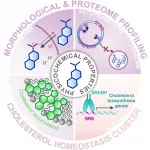Unlocking genetic clues behind aortic aneurysm
New study identifies a role of TCF7L2 in aortic aneurysm.
2021-07-22
(Press-News.org) A new study increases knowledge of the genetics behind aortic aneurysm, a disease that can spark life-threatening events like aortic dissections and ruptures.
University of Michigan Health-led researchers compared blood samples from more than 1,300 people who had a thoracic aortic aneurysm with more than 18,000 control samples, in partnership with U-M's Cardiovascular Health Improvement Project and its Michigan Genomics Initiative.
"After examining nearly the entire human genome for genetic changes that increase risk of aneurysm, we discovered a new change in the genetic code of a transcription factor, which means it controls many other genes," explained co-corresponding author Cristen Willer, Ph.D., a professor of cardiovascular medicine, internal medicine, human genetics and computational medicine and bioinformatics at University of Michigan Health.
Then, Willer's team collaborated with Minerva Garcia-Barrio, Ph.D., an assistant professor of internal medicine, to examine the role this gene played in smooth muscle cells, a component of aorta.
"We examined this gene in human cells and discovered that the transcription factor we identified is a key factor that gives instructions to cells about when to die and replenish," said co-lead author Tanmoy Roychowdhury, Ph.D., a research fellow in the Division of Cardiovascular Medicine.
The authors say future research might investigate whether slowing down this apoptosis, or cellular death, in aortic aneurysm could reduce the risk of a person experiencing an aortic dissection or rupture in the future.
INFORMATION:
ELSE PRESS RELEASES FROM THIS DATE:
2021-07-22
Around 50,000 people suffer sudden cardiac arrest in Germany every year. When occurring outside a hospital, the chances of survival are only ten percent. Survivors often suffer from severe permanent neurological damage. On July 21st, 2021, researchers from the Faculty of Medicine - University of Freiburg, Germany, published together with German and US colleagues a review article in the journal Nature Reviews Neuroscience. They describe the most important therapeutic factors for successful resuscitation. The scientists name the therapy concept based on these factors ...
2021-07-22
Key Takeaways
A survey of American College of Surgeons members found almost two-thirds treat firearm injuries and more than 85 percent support the organization advocating for policies to reduce firearm-related injuries.
Forty-two percent of ACS members keep firearms in their homes and nearly one-third (32 percent) of surgeon firearm owners store firearms unlocked and loaded.
Survey findings will enable the ACS to identify ways to engage all members, including gun owners, and advocate for initiatives that prevent firearm-related injuries.
CHICAGO (July 22, 2021): In what may be the largest survey of physician attitudes about firearms and how firearm-owning surgeons store guns in their homes, U.S. members of the American College of Surgeons ...
2021-07-22
Scientists at Cambridge and Leeds have successfully reversed age-related memory loss in mice and say their discovery could lead to the development of treatments to prevent memory loss in people as they age.
In a study published today in Molecular Psychiatry, the team show that changes in the extracellular matrix of the brain - 'scaffolding' around nerve cells - lead to loss of memory with ageing, but that it is possible to reverse these using genetic treatments.
Recent evidence has emerged of the role of perineuronal nets (PNNs) in neuroplasticity - the ability of the brain to learn and adapt - and to make memories. ...
2021-07-22
In the depths of space, there are celestial bodies where extreme conditions prevail: Rapidly rotating neutron stars generate super-strong magnetic fields. And black holes, with their enormous gravitational pull, can cause huge, energetic jets of matter to shoot out into space. An international physics team with the participation of the Helmholtz-Zentrum Dresden-Rossendorf (HZDR) has now proposed a new concept that could allow some of these extreme processes to be studied in the laboratory in the future: A special setup of two high-intensity laser beams could create conditions similar to those found near neutron stars. In ...
2021-07-22
Over the last few decades, neurodegenerative diseases became one of the top 10 global causes of death. Researchers worldwide are making a strong effort to understand neurodegenerative diseases pathogenesis, which is essential to develop efficient treatments against these incurable diseases. However, our knowledge about the basic molecular mechanisms underlying the pathogenesis of neurodegenerative diseases is still lacking. A team of researchers found out the implication of lysosomes in the spread of Parkinson's disease.
The accumulation of misfolded protein aggregates in affected brain regions is a common hallmark shared by several neurodegenerative diseases (NDs). Mounting evidence in cellular and in animal models highlights the capability ...
2021-07-22
Artificial intelligence tools and deep learning models are a powerful tool in cancer treatment. They can be used to analyze digital images of tumor biopsy samples, helping physicians quickly classify the type of cancer, predict prognosis and guide a course of treatment for the patient. However, unless these algorithms are properly calibrated, they can sometimes make inaccurate or biased predictions.
A new study led by researchers from the University of Chicago shows that deep learning models trained on large sets of cancer genetic and tissue histology data can easily identify the institution that submitted the images. The models, which use machine learning methods to "teach" themselves how to recognize certain cancer signatures, ...
2021-07-22
Replication of SARS-CoV-2, the virus responsible for COVID-19, depends on a series of interactions between viral proteins and different cellular partners such as nucleic acids (DNA or RNA). Characterizing these interactions is crucial to elucidate the process of viral replication and identify new drugs for treating COVID-19.
An interdisciplinary consortium of scientists from the Institut Pasteur, the Ecole Polytechnique, the Institut Curie, Inserm, the CNRS and the universities of Paris, Paris-Saclay, Bordeaux and Toulouse have demonstrated a specific interaction between a domain of a SARS-CoV-2 protein (Nsp3) and ...
2021-07-22
When Alexander Flemming discovered a mould on a culture plate overgrown with bacteria in 1928, he did not expect to find one of the most widely used active substances: penicillin. Accidental discoveries and the identification of active ingredients from traditional remedies, such as the morphine of the opium poppy, have shaped the discovery of new medicines for a long time.
Modern drug discovery - from chance to system
Meanwhile, major developments in chemistry and molecular biology have been made that enable a systematic and targeted search for potential active substances in modern drug discovery. First, advances in the field of organic and ...
2021-07-22
TROY, N.Y. -- An innovative testing platform that more closely mimics what cancer encounters in the body may allow for more precise, personalized therapies by enabling the rapid study of multiple therapeutic combinations against tumor cells. The platform, which uses a three-dimensional environment to more closely mirror a tumor microenvironment, is demonstrated in research published in Communications Biology.
"This whole platform really gives us a way to optimize personalized immunotherapy on a rapid, high throughput scale," said Jonathan Dordick, Institute Professor of chemical and biological engineering and member of the Center for Biotechnology and Interdisciplinary Studies (CBIS) at Rensselaer Polytechnic Institute, ...
2021-07-22
It's a favourite first-order for the day, but while a quick coffee may perk us up, new research from the University of South Australia shows that too much could be dragging us down, especially when it comes to brain health.
In the largest study of its kind, researchers have found that high coffee consumption is associated with smaller total brain volumes and an increased risk of dementia.
Conducted at UniSA's Australian Centre for Precision Health at SAHMRI and a team of international researchers*, the study assessed the effects of coffee on the brain among 17,702 UK Biobank participants (aged 37-73), finding that those who drank more than six cups of coffee a day had a 53 per cent increased risk of dementia.
Lead researcher and UniSA PhD candidate, ...
LAST 30 PRESS RELEASES:
[Press-News.org] Unlocking genetic clues behind aortic aneurysm
New study identifies a role of TCF7L2 in aortic aneurysm.

